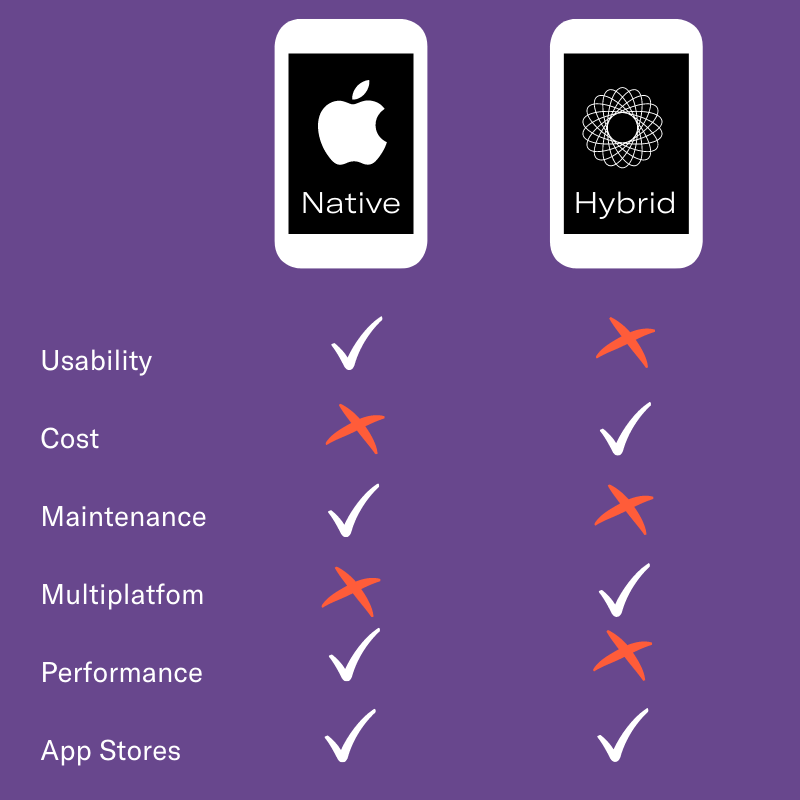What are the apps Multiplatform?
We are increasingly informed about purchasing decisions, the internet opens up a world of possibilities to collect data before even asking for a quote. In our sector, we have also noticed in recent years a remarkable advance in the knowledge that customers have, sometimes profane in technology, about what they are holding. And hence we dare with this post on the cross-platform apps, because we know that you all understand us.
It is clear that many of you already know that you need the development of multi-platform apps that suits both iOS and Android, but it is also true that on some occasions although the decision seems made it is not clear if you have opted for a native app or an app hybrid. So we will explain what is the development of cross-platform apps in both its native and hybrid version, its advantages and disadvantages and which one can best fit for our project.
Cross-platform apps development: what modalities are there?
Native App
In the native app, you develop specifically for each platform, using Java and Kotlin on Android and Objective and Swift on iOS.
The native app allows the developer to use the APIs (Application Programming Interface) that operating systems offers to facilitate their work. Thus, if we want, for example, to create an app with GPS access to show routes to our users, we will use the GPS API and we will not have to program a specific tool for each GPS.
Hybrid App
The best window of a hybrid app is that it can be multi-platform. It is called that because it allows the development of a single app to adapt to different operating systems. The hybrid app uses a WebView, a Google tool for developers, which allows embedding the content developed on the web within the application, simulating the Native UI of each platform. Therefore, they cannot directly access the system libraries as a native app or use some of the hardware advantages offered by devices with the same performance.
Web Apps
Although we will not go into more detail, I did not want to quit the web apps , web applications developed in HTML, JavaScript and CSS. They are programmed, like the hybrids, regardless of the operating system in which the application will be used. These apps run in the browser that we have installed through its url, so they are not published in the stores. In this post you can get more info about them.
Development of multiplatform applications: advantages and disadvantages
1. Usability in the development of multi-platform apps
Design is an element to keep in mind when we consider developing multi-platform apps. Each platform offers its own design guides which allows the developer and the designer to get the most juice possible to the device in the native app. This user experience is a fundamental element of the apps, and it wins the native hybrid app whose development does not think about the concrete platform. Android or iOS users are accustomed to the arrangement of the application elements in a certain way, while the hybrid app establishes the design elements in a concrete way without adapting to operating systems.
2. Cost of multiplatform application development
The fact that you only have to program a code in the development of cross-platform apps is a great saving when you decide on the hybrid app. In addition, the web-based programming language of hybrid apps is more widespread and therefore the rates of its developer may be reduced due there is a greater offer.
However everything will depend on the expertise of the development team and the needs of the mobile application in question.
3. Maintenance in the development of multi-platform apps
Although it may seem that here the hybrid app takes advantage of the native app because you only have to keep a single code for all platforms, the truth is that in the long run the maintenance of the hybrid app becomes more complex, let’s look at these peculiarities of the cross-platform apps development:
The new versions of the native development environments that appear with the updates of their operating systems try to maintain compatibility with previous versions as much as possible, which is an advantage when working on native way in each platform since it facilitates its maintenance and evolution.
Hybrid development environments need to make a great effort to always be up to date and offer the greatest possible coverage. This sometimes causes the code that we previously had and worked for several operating systems, requires specific additions for a specific platform and/or an operating system. This eventually results that maintenance of these codes becoming slower and more expensive.
4. To reuse code in the development of cross-platform apps
The hybrid app allows to reuse the same code for all operating systems, so it is called multi-platform apps or cross-platform apps. The native app needs to adapt to the different programming languages, so we will have to do a development for iOS and another for Android if we need our application to be available for these two operating systems. On the other hand, the hybrid app facilitates this process in the development of multi-platform apps by developing the software only once, and then exporting it to the different platforms.
5. Performance in the development of cross-platform apps
Although lately the performance of the hybrid app has improved significantly, we can continue talking about a better performance in the native app in the development of multi-platform apps. The native app can directly access the system libraries and thus the hardware resources in a better way.
6. Presence in stores in the development of multi-platform apps
While both the native app and the hybrid app can be published in the App Store and in Google Play, Apple is more demanding with the user experience and promotes the development of native apps (as it has demonstrated with the latest update of its guideline). This is because iOS gives great importance to the user interface, and as we have seen the native app offers a better experience by following the style guides of each platform.

Development of multi-platform apps: which one do I choose?
You can opt for a hybrid app when:
- the cost of the application is a key element
- the internet connection is not a problem
- the longer response time will be accepted by the user
- the usability is secondary
- it does not require very powerful graphics
You should opt for a native app when:
- quality, usability and user experience are key factors
- the app must access specific hardware components that
- you want to use the new features of each platform as soon as they are available
- you need to take advantage of graphics processors
- it will be use in a wearable
Conclusion
As we have seen in detail in the development of cross-platform apps, a native app behaves very in a different from a hybrid. So depending on the type of product that we want to move forward with our app, we must decide on one or the other. In general, the hybrid app is a faster and simpler solution with a lower cost and the native app offers a more complex development in exchange for better performance and greater attractiveness in both design and access to device hardware.





